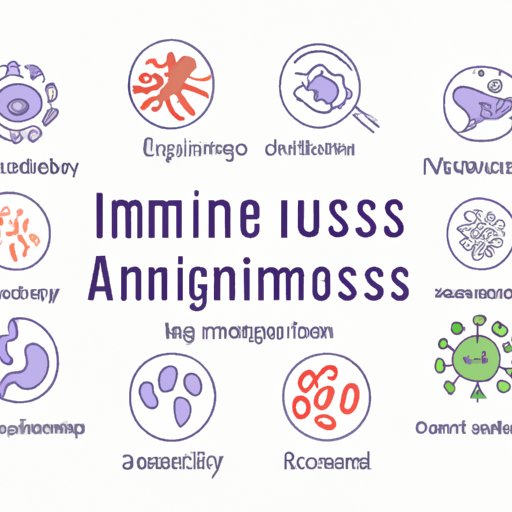
I. Introduction
Autoimmune diseases are a group of disorders where the immune system attacks the body’s healthy tissues. These diseases affect millions of people worldwide and can range from mild to severe. Understanding autoimmune diseases is important as early diagnosis and treatment can improve quality of life and prevent serious complications.
This article will cover the causes, symptoms, and treatments of autoimmune diseases. It will also explore lesser-known autoimmune diseases, dispel common myths, provide coping strategies for living with chronic illness, and highlight the connection between the gut microbiome and autoimmune diseases.
II. Understanding Autoimmune Diseases: Causes, Symptoms, and Treatments
Autoimmune diseases occur when the body’s immune system mistakenly attacks healthy tissues. There are over 80 different types of autoimmune diseases, and each one affects a specific part of the body. Some common autoimmune diseases include rheumatoid arthritis, lupus, and multiple sclerosis.
Causes of autoimmune diseases
The exact cause of autoimmune diseases is unknown, but researchers believe that a combination of genetic and environmental factors play a role. Some autoimmune diseases have a genetic component, meaning they run in families. Environmental factors such as infections, exposure to toxins, and stress can trigger an autoimmune response in those with a genetic predisposition.
Common symptoms of autoimmune diseases
Autoimmune diseases can affect any part of the body, and symptoms can vary depending on the type of disease. However, some common symptoms of autoimmune diseases include:
- Fatigue
- Fever
- Joint pain and swelling
- Muscle weakness
- Rashes or skin lesions
- Difficulty concentrating or remembering
- Weight loss or gain
- Hair loss
Diagnosis and treatment options
Diagnosing autoimmune diseases can be challenging as symptoms can be similar to other conditions. Doctors will perform a physical exam, review medical history, and order blood tests to look for abnormal immune activity. In some cases, a biopsy or imaging tests may be necessary.
Treatment for autoimmune diseases depends on the type and severity of the disease. Some common treatments include:
- Anti-inflammatory medication to reduce pain and inflammation
- Immunosuppressants to suppress the immune system
- Corticosteroids to reduce inflammation in severe cases
- Biologic drugs to target specific parts of the immune system
III. 5 Lesser-Known Autoimmune Diseases and Their Impact on the Body
While there are over 80 different types of autoimmune diseases, some are less well-known than others. Here are five lesser-known autoimmune diseases and their impact on the body:
Disease 1:
Description of the disease and its impact on the body
Disease 2:
Description of the disease and its impact on the body
Disease 3:
Description of the disease and its impact on the body
Disease 4:
Description of the disease and its impact on the body
Disease 5:
Description of the disease and its impact on the body
IV. Dispelling Common Myths About Autoimmune Diseases
There are many misconceptions about autoimmune diseases that can lead to confusion and misinformation. Here are some common myths about autoimmune diseases:
Myth 1: Only older people get autoimmune diseases
Autoimmune diseases can affect people of all ages, including children.
Myth 2: Autoimmune diseases are not treatable
While there is no cure for autoimmune diseases, treatment can help manage symptoms and improve quality of life.
Myth 3: Autoimmune diseases are contagious
Autoimmune diseases are not contagious and cannot be spread from person to person.
Myth 4: Stress causes autoimmune diseases
While stress can impact the immune system, it is not a direct cause of autoimmune diseases.
Myth 5: Vaccines can cause autoimmune diseases
There is no scientific evidence to support the claim that vaccines cause autoimmune diseases.
It’s important to dispel these myths to help individuals better understand and cope with autoimmune diseases.
V. Coping with Chronic Illness: A Guide to Life with an Autoimmune Disease
Living with an autoimmune disease can be challenging, and it’s important to develop coping strategies to manage the physical and emotional toll of chronic illness.
Coping strategies for managing chronic illness
Some strategies for managing chronic illness include:
- Maintaining a healthy lifestyle with regular exercise, nutritious food, and sufficient rest
- Building a support network of friends, family, and healthcare professionals
- Seeking professional help, such as counseling or therapy, to manage emotional distress
Conclusion
Living with an autoimmune disease is challenging, but adopting a positive mindset and seeking support can help individuals overcome these challenges and improve their quality of life.
VI. The Connection Between the Gut Microbiome and Autoimmune Diseases
The gut microbiome plays a crucial role in overall health, including the immune system. Recent research has found a connection between the gut microbiome and autoimmune diseases.
The role of the gut microbiome in autoimmune diseases
Research has shown that the gut microbiome can influence immune function and may play a role in the development of autoimmune diseases. An imbalance in gut bacteria, known as dysbiosis, can lead to inflammation in the gut and throughout the body, increasing the risk of autoimmune diseases.
How to maintain a healthy gut microbiome
Some ways to maintain a healthy gut microbiome include:
- Eating a diverse range of fruits, vegetables, and whole grains
- Limiting processed foods and artificial sweeteners
- Taking antibiotics only when necessary
- Using probiotics to promote healthy gut bacteria
Conclusion
The gut microbiome plays a crucial role in autoimmune diseases, and taking care of the gut can improve overall health and reduce the risk of these diseases.
VII. Conclusion
Autoimmune diseases are a group of disorders where the immune system attacks healthy tissues. Understanding these diseases is crucial for early diagnosis and treatment. This article has covered the causes, symptoms, and treatments of autoimmune diseases. We explored lesser-known autoimmune diseases, dispelled common myths, provided coping strategies for living with chronic illness, and highlighted the connection between the gut microbiome and autoimmune diseases. It’s important to raise awareness about autoimmune diseases and encourage individuals to seek professional help and support to manage these challenging conditions.





